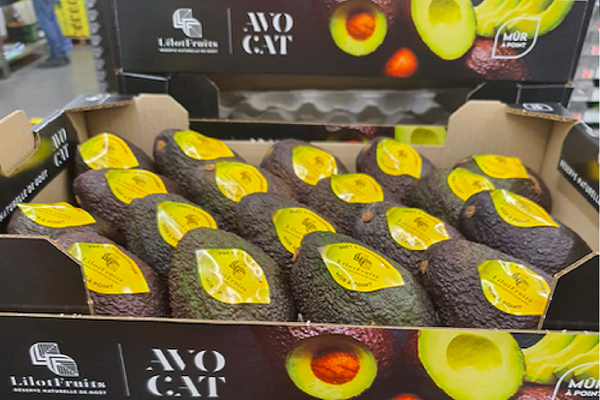While volumes from Mediterranean origins are dwindling, the avocado production from countries of the southern hemisphere is gradually taking over. "We are at the end of the Moroccan, Spanish, and Portuguese season, and the Israeli production should also finish at the end of April. At the same time, the first containers of avocados from Peru are arriving. We are in the midst of a transition between the northern and southern hemispheres," explains François Bellivier, development manager at Capexo. This changeover should really take place around Easter, when large volumes of Peruvian avocados are expected on the European market.
Alongside Peruvian avocados, the production from South Africa will soon be entering the market as well. Brazilian avocados, on the other hand, are facing logistical problems and should reach the European market when the Peruvian campaign is in full swing. These logistical issues will also affect Kenya for another year.
 © Capexo
© Capexo
Expected rise in Peruvian volumes
While it is still too early to make precise forecasts for the avocado season of the southern hemisphere, volumes in Peru are expected to be much higher than last year. "The previous Peruvian season was severely impacted by El Nino, but this year's volumes should not be much higher than they were two years ago." The increase in production is in line with a rise in demand, which is increasingly dynamic.
Managing peak production and grading: The main challenges for the coming season
Once again this year, the success of the season will depend on the management of two factors that remain unknown to date: the timing of peak production and grading. "We need to avoid excessive volumes arriving at the wrong time. This year being an 'off' year, synonymous with lower yields per hectare due to the alternation of trees, it is possible that the production peaks will be higher but that the campaign will end earlier, in September rather than November. The second challenge we are likely to face is the difference in grading in the first and second half of the season. Until mid-June, we are in a campaign of small sizes, which are often easy to honor and popular with the catering trade. But as soon as the larger sizes arrive, trade becomes more complicated. At that point, we may have to switch to another origin."
A look back at a successful Mediterranean season
This year marks a turning point in the history of avocado production in Mediterranean countries, with volumes sufficient to supply the French market for the first time. "French supermarkets clearly have a preference for European products. Morocco has been very popular this year, with a very high volume campaign and products of very good quality. If Moroccan production continues on this path, and in the absence of any major climatic disasters, the country should take a large share of the market over the next few years. As for Israel, supplies to the European and French markets have been greater this year, with less marked boycott. Spain continued to develop, and not only in Andalusia. As for Portugal, although production is not abundant, it is present. If all these origins combined continue to grow, it should not be necessary to import Latin origins at this time of year. As proof, up to week 16, we are at 16% in volumes of Peruvian avocados imported since the start of the year. This is due to the fact that last year, we were faced with a much larger deficit of Mediterranean products. For this season, if not for the very complicated weather conditions in Spain, Morocco, and Portugal, we would have had to go even further."
All in all, the Mediterranean season went well. "Prices recovered after the bad weather in Spain, Morocco, and Portugal, and now stand at €13.5 to €15 [14.8 to 16.5 USD]. Overall, sales have been brisk and average prices were quite good, so the campaign has been a positive one. The development of Mediterranean production also brings another advantage: the transition from one hemisphere to the other is easier because the market is less confronted with any lack of volume."
 For more information:
For more information:
François Bellivier
Capexo
Phone: +33 1 41 73 23 00
Mobile: +33 6 75 03 76 54
f.bellivier@capexo.fr
www.capexo.fr
